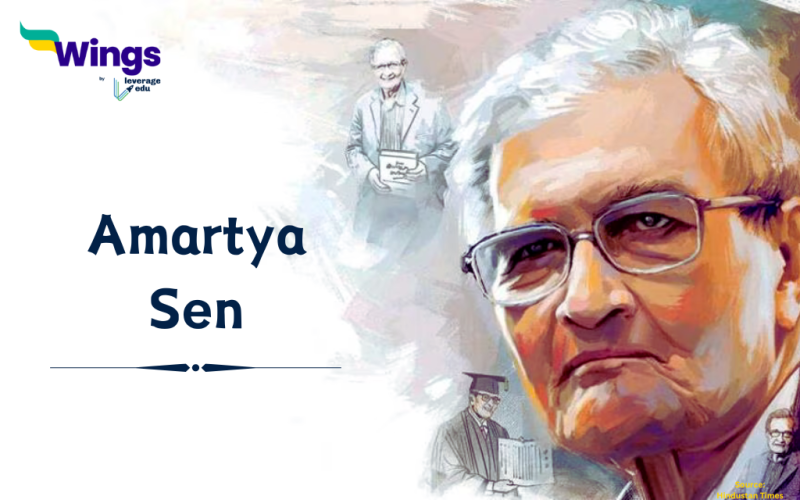Amartya Kumar Sen is an Indian economist and philosopher who has taught and worked in England and the United States since 1972. He received the Nobel Memorial Prize in Economic Sciences for his contributions to the field of welfare economics in 1998. Read this blog to learn more about Amartya Sen’s life, contributions, and more.
Table of Contents
| Overview of Amartya Sen | |
| Life | Born 1933 in Santiniketan, India |
| He witnessed the Bengal Famine (1943), which influenced his work. | |
| Studied economics at Presidency College (Calcutta)/Cambridge University, and Harvard University | |
| Career Highlights | Professor of Economics and Philosophy at Harvard University |
| Previously held positions at Universities in India, the UK, and the US | |
| Contributions | Developed methods to measure poverty (Sen Index), focusing on capabilities |
| Highlighted the role of social and economic factors in famines, not just food shortages. | |
| Explored how individual preferences translate into social decisions. | |
| Recognition | 1998 Nobel Memorial Prize in Economic Sciences |
| Bharat Ratna (India’s highest civilian award) | |
| Peace Prize of the German Book Trade | |
Also read: Who Was Sir Syed Ahmed Khan?
Early Life and Education of Amartya Sen
Amartya Sen was born on November 3, 1933, in a Bengali family in Santiniketan, Bengal, British India.
- He completed his education at Presidency College in Calcutta.
- Sen developed oral cancer while attending Presidency College. Despite a poor survival rate, he underwent successful radiation therapy and continued his studies.
- Sen was deeply affected by the Bengal Famine of 1943, which killed millions of people.
- This experience most likely influenced his later focus on poverty, development, and social justice.
- In 1953, Sen moved to Trinity College, Cambridge, for further studies in economics.
Also read: Amrita Pritam: Life, Poems & Awards
Awards Won By Amartya Sen
Amartya Sen won a number of awards for his work some of which are as follows:
| Award | Year | Bestowed By | Field Recognized |
| Adam Smith Prize | 1954 | University of Cambridge | Early Economics Scholarship |
| Nobel Memorial Prize in Economic Sciences | 1998 | Royal Swedish Academy of Sciences | Welfare Economics and Social Choice Theory |
| Bharat Ratna | 1999 | Government of India | Contribution to Welfare Economics |
| Honorary Citizenship of Bangladesh | 1999 | Government of Bangladesh | Recognition of Intellectual Achievements |
| Honorary Member of the Order of the Companions of Honour | 2000 | United Kingdom | Contribution to Public Life |
| Leontief Prize | 2000 | World Trade Institute Foundation | Advancing Understanding of Global Economic Issues |
| Eisenhower Medal for Leadership and Service | 2000 | American Assembly | Public Service |
| National Humanities Medal | 2004 | President of the United States | Contributions to Philosophy and Economics |
| Princess of Asturias Award in Social Sciences | 2010 | Princess of Asturias Foundation | Work on Famine, Development, and Social Inequality |
| Peace Prize of the German Book Trade | 2020 | German Publishers and Booksellers Association | Pioneering Scholarship on Global Justice and Social Inequality |
| Gold Medal | 2021 | The National Institute of Social Sciences | Lifetime Achievement in Social Sciences |

Amartya Sen Books
Some of his best literary works are –
| Books | Year |
| Poverty and Famines: An Essay on Entitlement and Deprivation | 1982 |
| Collective Choice and Social Welfare (1st ed.) | 1970 |
| On Ethics and Economics | 1987 |
| Inequality Reexamined | 1992 |
| India, economic development and social opportunity | 1998 |
| Freedom, Rationality, and Social Choice: The Arrow Lectures and Other Essays | 2000 |
| Peace and Democratic Society. Cambridge, UK | 2011 |
| Home in the World: A Memoir. | 2020 |
FAQs
Amartya Sen is an Indian economist and philosopher, Nobel laureate known for his work in welfare economics and social justice, influenced by his experiences during the Bengal Famine.
Sen developed the Sen Index to measure poverty, highlight social factors in famines, and explore how individual preferences impact societal choices.
Sen received the Nobel Prize in Economics (1998), Bharat Ratna (1999), and various international honours for his contributions to economics, philosophy, and global social justice.
If you want to know more about other Famous Personalities then visit our General Knowledge page!
 One app for all your study abroad needs
One app for all your study abroad needs













